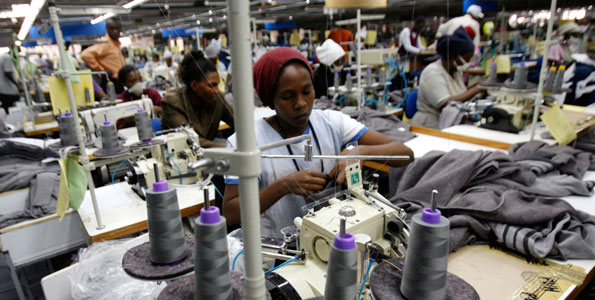
“As a casual worker, I do not get a bonus, or paid holiday or severance pay. I am looking for a place to stay so that I can collect all my children to stay with me. To be a mother with all my chickens under my wings.”
- Rage, picking fruit in South Africa for export to UK supermarkets
“We have to do overtime until midnight to earn a decent income. I am afraid of having children because I wouldn’t be able to feed them.”
- Nong, 26, sewing underwear for Victoria’s Secret in Thailand
“We don’t have the right to be sick. One day when I was not well and I took a doctor’s note to my employer, he gave me a written warning.”
- Zakia, 36, sewing garments for Spain’s El Corte Ingles in Morocco
Globalization has drawn millions of women into paid employment across the developing world. Today, supermarkets and clothing stores source the products that they sell from farms and factories worldwide. At the end of their supply chains, the majority of workers – picking and packing fruit, sewing garments, cutting flowers – are women. Their work is fueling valuable national export growth. And their jobs could be providing the income, security, and support needed to life them and their families out of poverty. Instead, women workers are systematically being denied their fair share of the benefits brought by globalization…
The harsh reality faced by women workers highlights one of the glaring failures of the current model of globalization. Over the past 20 years, the legal rights of powerful corporate entities have been dramatically deepened and extended. Through the World Trade Organization and regional and bilateral trade agreements, corporations now enjoy global protection for many newly introduced rights. As investors, the same companies are legally protected against a wide range of governments’ action. Workers’ rights have moved in the opposite direction. And it is no coincidence that the rise of the ‘flexible’ worker has been accompanied by the rise of the female, often migrant, worker. The result is that corporate rights are becoming ever stronger, while poor people’s rights and protections at work are being weakened, and women are paying the social costs.
Exploiting the circumstances of vulnerable people – whether intentionally or not – is at the heart of many employment strategies in global supply chains. Of course vulnerable social groups desperately need employment as a means of escaping poverty and inequality. But it is no escape at all if the way that they are employed turns their vulnerability into an opportunity for employers to pay them less, work them harder and longer, and avoid paying their rightful benefits. ..The impacts of such precarious employment go far beyond the workplace. Most women are still expected to raise children and care for sick and elderly relatives when they become cash-earners. They are doubly-burdened, and, with little support from their governments or employers to cope with it, the stress can destroy their own health, break up their families, and undermine their children’s chances of a better future. The result: the very workers who are the backbone of wealth creation in many developing countries are being robbed of their share of the gains that trade could bring.
- In Chile, 75 per cent of women in the agricultural sector are hired on temp contracts picking fruit, and put in more than 60 hours a week during the season. But one in three still earns below the minimum wage.
- Fewer than half of the women employed in Bangladesh’s textile and garment export sector have a contract, and the vast majority gets no maternity or health coverage – but 80% fear dismissal if they complain.
- In China’s Guangdong province, one of the world’s fastest growing industrial areas, young women face 150 hours of overtime each month in the garment factories – but 60 % have no written contract and 90% have no access to social insurance.
I walked into a local hipster coffee shop the other day, saw the cover, had a cursory glance and knew how important this was. I started transcribing it right away, oblivious to the fact that it's already fully on the interwebz in full color. Please read with me here.
No comments:
Post a Comment
Be kind. Rewind.